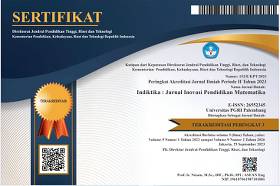ANALISIS KESALAHAN SISWA SD DALAM MENYELESAIKAN SOAL CERITA OPERASI HITUNG BILANGAN CACAH DAN PEMBERIAN SCAFFOLDING
DOI:
https://doi.org/10.31851/indiktika.v2i1.3396Abstract
Â
Penelitian ini bertujuan untuk mengetahui kesalahan siswa dalam memecahkan masalah di kelas III SD Negeri 2 Sumberejo dalam menyelesaikan soal cerita materi operasi hitung bilangan cacah. Jenis penelitian ini menggunakan penelitian deskriptif kualitatif. Subjek penelitian terdiri dari 19 siswa. Berdasarkan hasil tes, diambil 3 siswa dari subjek berkemampuan rendah, sedang, dan tinggi. Instrumen penelitian yaitu tes yang berupa soal uraian dengan materi operasi hitung bilangan cacah, kemudian dilakukan wawancara dan scaffolding. Dari hasil tes tersebut dilakukan analisis dan penarikan kesimpulan, lalu diberikan scaffolding. Hasil penelitian menunjukkan jenis kesalahan yang dilakukan subjek berkemampuan rendah yaitu kesalahan konsep berupa kurangnya memahami isi yang ada pada soal, dan kesalahan prosedur  berupa siswa tidak menyelesaikan sampai hasil akhir, memecahkan masalah soal cerita tidak dilakukan dengan baik sehingga berpengaruh terhadap hasil jawaban yang diperoleh. Jenis kesalahan yang dilakukan subjek berkemampuan sedang yaitu   kesalahan konsep dan kesalahan prosedur. Jenis kesalahan yang dilakukan subjek berkemampuan tinggi yaitu kesalahan prosedur berupa siswa kurang tepat saat menghitung hasil akhir. Cara pemberian scaffolding kepada anak berkemampuan rendah dan sedang dengan cara peninjauan kembali, penjelasan, dan penguatan. Sedangkan anak berkemampuan tinggi pemberian scaffolding dengan cara penguatan saja.
                                                                                                                 Â
Kata kunci : analisis kesalahan, soal cerita, scaffolding
Â
ABSTRACT
This study aims to find out the students' mistakes in solving problems in class III SD Negeri 2 Sumberejo in solving story problems in counting numbers. This type of research uses descriptive qualitative research. The research subjects consisted of 19 students. Based on the test results, 3 students were taken from low, medium, and high ability subjects. The research instrument was a test in the form of a description of the material with a count operation number, then conducted interviews and scaffolding. From the test results the analysis and conclusion are taken, then scaffolding is given. The results showed the type of error made by low-ability subjects, namely concept errors in the form of a lack of understanding of the contents of the questions, and procedural errors in the form of students not completing until the final results, solving problems with story problems were not done well so that it affected the results of the answers obtained. The types of errors made by subjects with moderate ability are concept errors and procedural errors. The type of mistakes made by highly capable subjects is procedural errors in the form of students being incorrect when calculating the final results. How to provide scaffolding to children with low and moderate abilities by way of review, explanation, and reinforcement. While high-ability children giving scaffolding by way of reinforcement.
Keywords : error analysis, story matter, scaffolding
References
Amiripour, P., et al. 2012. Scaffolding as effective method for mathematical learning. Indian Journal of Science Technology, Vol. 5(9) : 3328-3331.
Anghileri, Julia. 2006. Scaffolding Practices that Enhance Mathematics Learning. Journal of Mathematics Teacher Education, Vol. 9(1) : 33-52.
Hartini, S., Suwarno dan Marsudi, S. 2008. Psikologi Pendidikan. Surakarta: Bimbingan dan Penyuluhan FKIP Universitas Muhammadiyah Surakarta.
Hudojo, Herman. 2003. Strategi Pembelajaran Matematika Kontemporer. Bandung: Universitas Pendidikan Indonesia.
Jauhari, Mohammad. 2011. Implementasi PAIKEM : dari Behavioristik sampai Konstruktivistik. Jakarta: Prestasi Pustaka.
Kastolan. 2007. Kompetensi Matematika. Jakarta: Yudhistira.
Roebyanto, Rubino. 2009. Metode Penelitian Pendidikan. Surakarta: Bimbingan dan Penyuluhan Universitas Muhammadiyah Surakarta.
Rusdianto, H.D. 2010. Analisis Kesalahan Siswa Kelas VII-G SMP Negeri 1 Tulangan Sidoarjo dalam Menyelesaikan Masalah-masalah Perbandingan Bentuk Soal Cerita. Skripsi tidak diterbitkan. Surabaya: IAIN Sunan Ampel.
Santrock, J.W. 2011. Psikologi Pendidikan. Edisi kedua. Jakarta: Kencana.
Sugiyono. 2013. Metode Penelitian Pendidikan (Pendekatan Kualitatif). Bandung: Alfabeta.
Sukmadinata, Nana Syaodih. 2009. Metode Penelitian Pendidikan. Bandung: Remaja Rosdakarya.
Downloads
Published
Issue
Section
License
This work is licensed under a Creative Commons Attribution-ShareAlike 4.0 International License.
Authors who publish with this journal agree to the following terms:
- Authors retain copyright and grant the journal right of first publication with the work simultaneously licensed under a Creative Commons Attribution License that allows others to share the work with an acknowledgement of the work's authorship and initial publication in this journal.
- Authors are able to enter into separate, additional contractual arrangements for the non-exclusive distribution of the journal's published version of the work (e.g., post it to an institutional repository or publish it in a book), with an acknowledgement of its initial publication in this journal.
- Authors are permitted and encouraged to post their work online (e.g., in institutional repositories or on their website) prior to and during the submission process, as it can lead to productive exchanges, as well as earlier and greater citation of published work.













